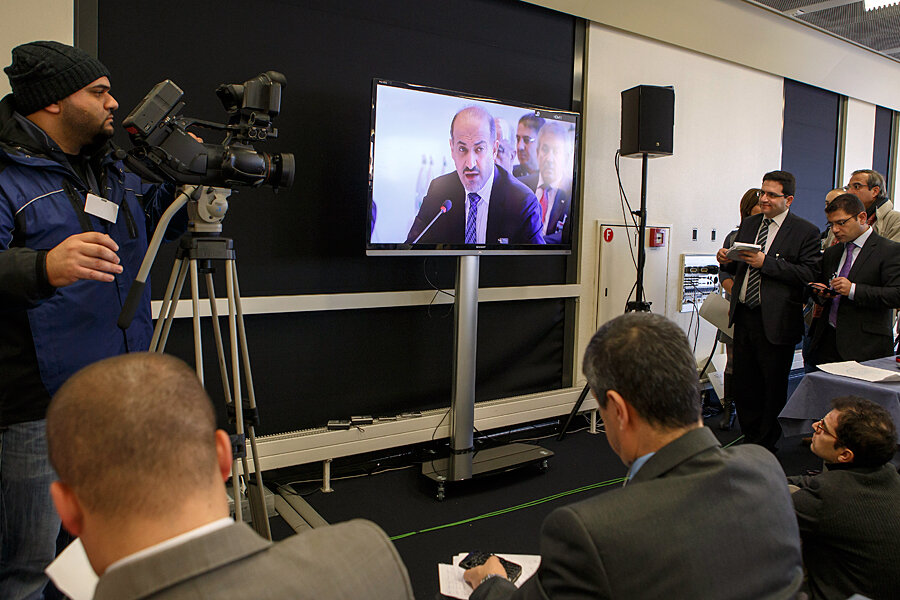Desperate for peace, Syrian rebels tear up playbook
Loading...
| Istanbul
Testing assumptions behind the headlines
When Syria’s main opposition group sits around the table later this week with representatives of President Bashar al-Assad's regime it will be breaking its own rules. The fractious opposition has previously refused such contact, instead calling absolutely for the end of Mr. Assad’s rule.
But today in Montreux, Switzerland, opposition leader Ahmed Jarba and Syrian Foreign Minister Walid al-Moualem traded charges of “terrorism” back and forth, face-to-face, in speeches at the opening of United Nations-sponsored peace talks.
The issue of direct talks caused a split in the umbrella Syrian National Coalition (SNC) last week, nearly derailing its attendance at the Geneva II talks. When it was formed last year, the SNC charter forbid direct contact with the enemy.
“They did not pay any attention to the rules of the coalition” before going to Geneva, says Khaled al-Khoja, an SNC member in Istanbul who was among 44 that split from the main group and refused to attend.
The rule was “flexible” when first agreed, says Mr. Khoja, and dependent on an agreement from those inside Syria. They were asked, and their response was that three pre-conditions had to be met: ending blockades on rebel areas, freeing prisoners, and an end to government shelling of cities and rebel areas.
None were met before Jarba said the group would go to Geneva.
“Jarba is going now without a consensus. That is very dangerous,” says Khoja. Jarba’s speech today was good, he said, and “the hero is the one who will make the other side withdraw.”
“If Ahmed Jarba can come back from Geneva without negotiating with Walid al-Moualem, there will be a chance to repair the damage between [him] and other elements” of the opposition, says Khoja.
But the Syrian foreign minister’s speech gave no indication that the regime was even considering ceding any power, much less handing it over. “Nobody in this world has the right to withdraw the legitimacy of a president or government…other than the Syrians themselves,” he said.
It is no surprise that much of the opposition refuses direct talks. The strategy is straight from the playbook of Gene Sharp, the godfather of nonviolent revolution, whose teachings have been effectively applied from Serbia and Georgia to Tunisia.
In his book "From Dictatorship to Democracy," there is an entire chapter called “The Dangers of Negotiations.”
“The offer by a dictatorship of ‘peace’ through negotiations with the democratic opposition is, of course, rather disingenuous,” writes Mr. Sharp. “The violence could be ended immediately by the dictators themselves, if only they would stop waging war on their own people.”
“When the dictatorship is strong but an irritating resistance exists, the dictators may wish to negotiate the opposition into surrender under the guise of making ‘peace,’” adds Sharp. “The call to negotiate can sound appealing, but grave dangers can be lurking within the negotiating room.”






